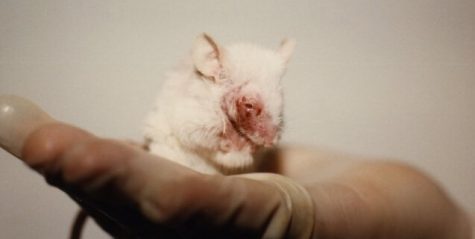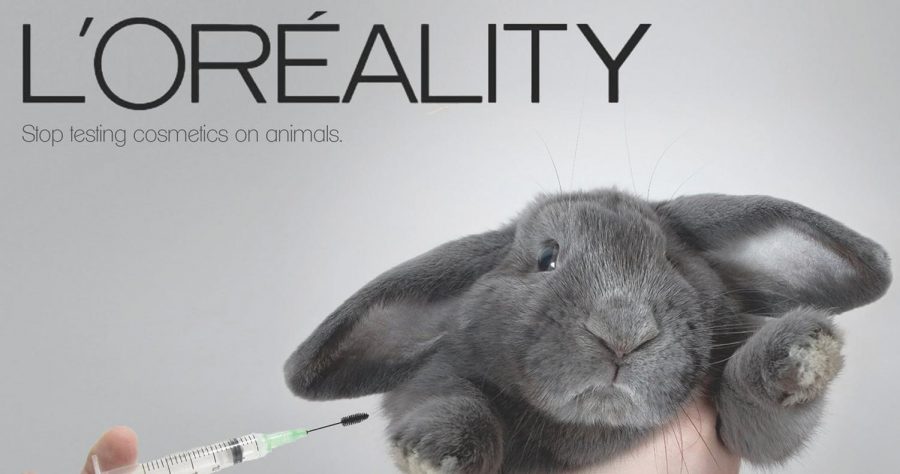The Disgusting use of Makeup Testing on Animals
Well-known brand L’oreal is still listed by PETA as a production company that tests new products on animals.
With the recent boom of makeup sales in the market, it is not hard to wonder if some of society’s favorite makeup brands rely on animal testing before releasing their product to the public. Many brands have declared themselves to be cruelty-free; however, not all have done so. This only means that these companies are okay with testing their product on defenseless, small creatures that ultimately suffer through the process of makeup testing.
During their time in laboratories, various species of animals are subjugated to extreme living conditions that can only be described as criminal. They are caged, blinded and completely shaved to expose their skin in order for researchers to have a clear sighting of the tested skin. In light of these gruesome conditions, the public has expressed their opinion against animal testing and has pleaded for other options.
“Alternative methods and their rise have allowed for an ethical gap where we should not consider animal testing anymore and allow for these methods to replace animal testing,” junior Alain Perez said.

Although society likes the variety of makeup, are they considering what is happening behind the scenes?
Polls have demonstrated that consumers are not supportive of animal testing and believe laboratories should find other, non-harmful ways to test products for humans.
“I find it completely inhumane how some companies will put money and sales over life. Even if it is an animal, it is still breathing and its heart is still beating,” sophomore Patricia Gonzalez said.
Some may argue how animal testing comes in to play when medicine is involved. While there are many types of research studies on animal cells and animals themselves, cosmetics are luxury items and not necessarily life dependent, like vaccines and other drugs that could be used to fight cancer and other malicious viruses.
However, well-known companies like Avon, Clinique, Maybelline (New York) and Estee Lauder heavily rely on animals to ensure their products are safe for sale—even though new “innovative techniques” have been discovered for makeup testing. If makeup goes untested in some way and is then released to the public, there is no way of knowing how it would affect each and every person who uses it. There could be long-term or short-term effects on a person’s face or body part. It also needs to be taken into consideration that the makeup of choice is going to be applied directly onto a piece of skin that carries an indeterminable number of pores, and thus can carry any type of toxicity found in the ingredients into the body system. A validation study measures the toxicity found in makeup and applies these cultures to cells and the appropriate data is then stored and studies. However, this method is expensive and takes time, so companies turn to animal testing since it is quick, cheap and efficient. Makeup should be tested, but animals should not be hurt during the process.
Some companies hold the belief that reactions present while testing on the animal skin may also present themselves to a human consumer. However, this method of testing and the inferring reaction has been debunked and proved to be one-hundred percent inaccurate. With the new advances in technology, it is time to move past animal testing and welcome a new era that provides a true “cruelty-free” world in the face of cosmetics. It is time to move past monetary numbers and selfish gain. All life is precious, and with this being said, an animal’s life is precious also. This term does not just apply to friendly house-hold pets, but to all creatures who in turn make our environment and ecosystem function.
While there is still time for these companies to become “cruelty-free,” we can only hope they realize how truly devastating the act of endangering the lives of these creatures in the name of science and consumerism is. If not for the sake of the animals, but for the sake of morality. Is potential profit more important and more valuable than the lives of hundred animals that are lost in this inhumane process?
Luckily, there are those who are against these testing sites and process, and these admirable companies have been listed on PETA’s list of cruelty-free companies. They can be found here.
Your donation will support the student journalists of Coral Gables Senior High School. Your contribution will help us cover our annual website hosting costs.

Jesse Zambrano is a senior in the International Baccalaureate (IB) program. When she arrived to the US, it was clear to Zambrano how important it was to...












